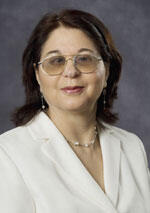April 23, 2009
Researcher Honored by the American Society for Biochemistry and Molecular Biology with Avanti Award in Lipids
Share this story

The American Society for Biochemistry and Molecular Biology has named Sarah Spiegel, Ph.D., an internationally renowned researcher and professor and chair of the Department of Biochemistry and Molecular Biology in the Virginia Commonwealth University School of Medicine, a recipient of the Avanti Award in Lipids.
The award honors outstanding scientists whose research interests are in the field of lipids — fat-soluble, naturally occurring molecules, such as fats, oils, waxes and cholesterol.
Spiegel, who is also the program co-leader of the Cancer Cell Biology Program at the VCU Massey Cancer Center and the Mann T. and Sara D. Lowry professor of oncology, has received multiple grants from the National Institutes of Health to continuously fund her research for nearly 20 years.
“Sarah Spiegel is among the world’s pioneers in the field of cellular signaling,” said Sheldon M. Retchin, M.D., CEO of the VCU Health System and vice president for VCU Health Sciences. “Her work has led to an explosion of interest in what makes abnormal cells grow, such as cancer cells, and what leads to cellular death.”
“We are so proud of this recognition of her work. The Avanti Award is a well-deserved honor for one of the most outstanding faculty scientists at the university,” Retchin said.
Spiegel, who is internationally recognized for her pioneering work on new lipid mediators that regulate cell growth and cell death, first discovered the role of S1P in cell growth regulation nearly a decade ago. Spiegel and her colleagues are continuing this work to better understand the functions of these enzymes, but S1P is now the most thoroughly characterized mediator in this field.
Last year, Spiegel was named a fellow of the American Association for the Advancement of Science for her discovery of a potent lipid mediator, which she demonstrated to have important roles in cancer, inflammation and allergy.
In 2003, she was awarded a National Institutes of Health MERIT award of nearly $2.1 million to continue her research on sphingosine1-phosphate (S1P). The award is given to investigators who have demonstrated superior competence and productivity in biomedical research.
Seven other scientists were recognized for their outstanding achievements and contributions to science this year: David Davies of the NIDDK, National Institutes of Health; John Kuriyan, Howard Hughes Medical Institute Investigator and Chancellor's Professor at the University of California, Berkeley; Susan Lindquist, an HHMI Investigator, member of the Whitehead Institute for Biomedical Research and professor at the Massachusetts Institute of Technology; Douglas Rees, an HHMI Investigator and professor of chemistry at the California Institute of Technology; Phillip Zamore, HHMI Investigator and professor at the University of Massachusetts Medical School; Sandra Schmid, an investigator at the Scripps Research Institute; and Rochelle Schwartz-Bloom of Duke University Medical Center.
The awards were presented at the Experimental Biology 2009 Meeting April 18-22 in New Orleans.
Subscribe to VCU News
Subscribe to VCU News at newsletter.vcu.edu and receive a selection of stories, videos, photos, news clips and event listings in your inbox.










